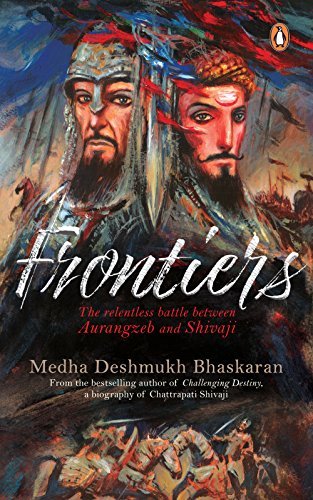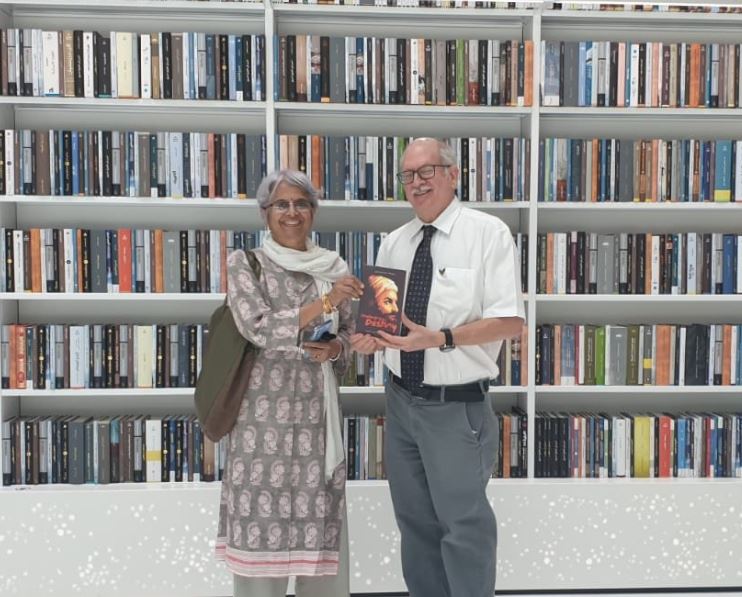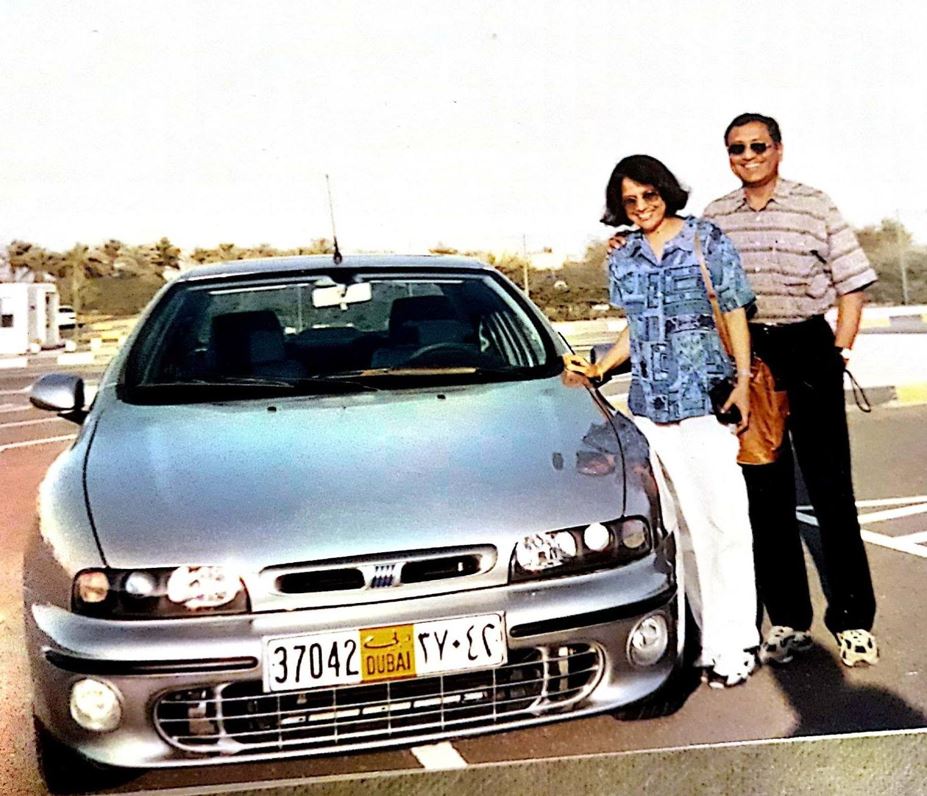(June 21, 2023) Author Medha Deshmukh Bhaskaran is a microbiologist with a career in pharmaceutical industry spanning thirty-five years. In 1975 when studying in Germany was not as common as it is in 2023, she travelled to the country to study fermentation technology as a twenty-year-old. Upon completion of the course, she came back to India and worked in the pharmaceutical industry before relocating to Dubai for 15 years, where work took her to South Africa, the Middle East, and the US. Bhaskaran has been a health columnist with Khaleej Times and Gulf News. Currently residing in Bengaluru, the bestselling author leads a fulfilling life inspiring people with her powerful books.
“NRIs don’t want to come back because they don’t like the dust and crowd and indiscipline on the road. Even I dislike these, but I thought, “What right do I have to talk against India if I cannot do anything about it?”, says Medha Bhaskaran as she connects with Global Indian for an interview. “I wondered what I could do for my country and finally decided to write about one of the greatest heroes of India to inspire the young Indians. “Being a Maharashtrian, who else could I have written about if not Chhatrapati Shivaji Maharaj? I call him Shivrai with love,” the author shares. “Inadequately perceived by many, he is not just a Maharashtrian hero, he is an Indian hero and the world can take inspiration from his thoughts,” she remarks.

Medha Deshmukh Bhaskaran
Out of her highly acclaimed five books, three are part of a trilogy on the life and triumphs of Shivaji¸ one of the greatest Indian rulers of all times. Bhaskaran was living in Dubai when the seed of writing a book on the great hero germinated in her mind. It took her a decade to start. “There are many authors who have given their lives to the history of Shivrai so to get that history into my system took 10 years. Unless that history flows in your blood, you cannot write the story,” tells the microbiologist-turned-author.
As part of the preparation of the trilogy, Bhaskaran referred to more than 100 books, visited medieval forts of India, and held discussions with historians, weapon experts, and other people involved in the study of Maratha-Mughal history.
The transition
After years of working in the pharmaceutical industry and as a health columnist for prestigious publications in the Gulf, Bhaskaran wanted to desperately change the narrative of her life. The world of diseases, prevention, treatment, new products, business development, targets, and deadlines intrigued her no more. Weekend parties in Dubai did not interest her either. “I was getting restless,” she says.
During her marketing presentations at the office, while driving at a speed of over a hundred kilometres per hour on Emirate’s highways, and even while cooking at home, something constantly kept nudging her. Finally, she returned to India after one-and-a-half decades of glitz that Dubai had offered to look after her ageing parents and – perhaps, to write books to serve as a source of inspiration.
“In my nascent vision, there was this trilogy unfurling – the story of the conflict between two mightiest men, Chhatrapati Shivaji, and Emperor Aurangzeb, the men who changed the destiny of millions, the men who had the power to stir the soul of India.
“I thought if I must write about Shivrai, I must show how big his enemy was. Unless you know Aurangzeb, you cannot understand Shivrai. Just as you must know Mogambo to understand Mr. India,” she smiles.
Bringing history alive
While writing Frontiers of Karma – The Counterstroke, her first book, Bhaskaran virtually lived in the past. Expressing how she felt she remarks, “Footprints fade away, even the tracks erode, but the past still pulsates inside the earth, like lava, all set to explode.”
With seventy books from her parents’ collection on Shivaji’s valour, along with numerous others, Bhaskaran embarked on a journey to transport herself to the 17th century. Her mission – is to unveil history as a captivating tale and present historical novels in a manner that resonates with even the millennial and GenZ generations, enabling them to grasp and connect with centuries-old stories. “My youngest fan is a 12–13-year-old,” the author smiles.

Cover image of one of the books by Medha Deshmukh Bhaskaran
With seventy books from her parents’ collection on Shivaji’s valour, along with numerous others, Bhaskaran embarked on a journey to transport herself to the 17th century. Her mission – is to unveil history as a captivating tale and present historical novels in a manner that resonates with even the millennial and GenZ generations, enabling them to grasp and connect with centuries-old stories. “My youngest fan is a 12–13-year-old,” the author smiles.
Strategies that worked
Bhaskaran did not just make use of prose in the trilogy but also interesting techniques to capture the readers’ minds. “With my background in marketing I used lots of tables and pie charts and other strategies like converting 17th-century currency into today’s dollar value to help youngsters relate to the times, “she says.
A notable section of her trilogy delves into a comparative analysis between Shivrai’s attack on Shaista Khan and Obama’s attack on Osama Bin Laden, highlighting intriguing similarities between the two operations. “I received lots of appreciation from the readers and reviewers for this,” she says.
Taking Shivaji out of Maharashtra
Bhaskaran chose to write her books in English because of two reasons – “English as a language has become like the dough of chapatti for me, something that I can twist and turn the way I want to while doing the same in other languages is challenging,” says the author who had started her studies in Marathi medium schools as a child.
“Also, I wanted to take Shivrai out of Maharashtra. He was far ahead of his time in tackling issues like – human trafficking, introducing the modern military system’s chain of command, introducing military laws that no one had thought of before, and changing correspondence from Persian to Marathi and Sanskrit. He did not fight just with swords. He fought with thoughts and words. His mind was his greatest weapon,” she says.

Medha Deshmukh Bhaskaran at Mohammad Bin Rashid Library, Dubai
Early years – From India to Germany
Bhaskaran experienced a childhood of moving across cities, attending Marathi medium schools before transitioning to English medium for her graduation in microbiology in Mumbai. In 1975, as one of the rare Indian students in Germany, she studied German and worked at a brewery. She recalls being seen as an alien due to her appearance, as Indians were a rarity at that time.
“The only black-haired people that I could see there were the Koreans and some Turkish people.” Narrating an incident, she breaks into German: “When I went to a small town in Germany, a little girl who had never seen a black-haired person before asked her grandmother in surprise – ‘Oma was ist das? (Grandmother, what is this?)’, to which the grandma replied, “Das ist ein Madchen (This is a Girl),” she laughs emphasizing how Indians were like aliens to common people in Germany back then.
Upon returning to India, Bhaskaran chose pharmaceutical marketing over laboratory work and found great satisfaction in her decision. “I loved it,” she says.
Life in Dubai
Before departing for Germany, Bhaskaran had already met the man who would later become her husband. Her father, who was ‘one of the most progressive men of his time’ had expressed that if their relationship endured during Bhaskaran’s two-year stay in Germany, it would prove its strength. And indeed, it did. She returned, they got married and enjoyed blissful years with their two sons in Bengaluru until her husband received a job posting in Dubai.
Initially, Bhaskaran did not find a job in Dubai. Since she had dabbled in poetry in Marathi and English from a young age, she turned to write and became a health columnist for Khaleej Times and Gulf News, submitting articles in person during the pre-internet era. Her columns published in the weekend magazine of Khaleej Times, which was the official magazine of Emirates Airlines, reached readers in various countries. “Readers used to write to me showing their appreciation.” Bhaskaran got the first taste of how writers make a difference in readers’ lives.
Her writing caught the attention of pharmaceutical companies who started inviting her to give lectures and eventually one of the organisations offered her a job. She switched to another organisation later. “I used to drive across the Gulf organising seminars for pharmacists, doctors, outdoor workers, and homemakers. There was a time when I received a new car from my organisation every year for six years straight and by then I had got fed up with the smell of a new car,” she smiles. Work took her on short trips in South Africa, the Middle East, and the US as well. “It was fun to travel for work and meet different people.”

Medha Deshmukh Bhaskaran with her late husband in Dubai
After a 15-year stint in Dubai Bhaskaran returned to India and started shuttling between centuries as a bestselling author of well-researched books. Five have been published while two manuscripts are underway.
Books by Medha Deshmukh Bhaskaran:
- Challenging Destiny – Biography of Chhatrapati Shivaji – Bhaskaran’s debut novel published by the Write Place – publishing initiative by Crosswords Bookstores, got nominated for two categories of Raymon Crossword Book Awards, translated in Marathi (Zunz Niyatishi) and Hindi (Niyati ko Chunauti), available in audible version, national bestseller
- Frontiers of Karma – The Counterstroke – Published by Penguin Random House, showcases emperor Aurangzeb as a significant protagonist alongside Shivaji, Marathi edition – ‘Ranasangram’
- Life and Death of Sambhaji – Published by Penguin Random House, the final book of the trilogy, translated in Hindi and available in audible book format, received high ratings on Amazon – evoking emotional responses from readers
- Prescription of Life – Explores the pharmaceutical industry from Bhaskaran’s 35 years of experience, presenting both positive and negative aspects of the Indian and international sectors
- Up Against Darkness – Recently launched at the World Book Fair in New Delhi (2023), focuses on the lives of sex workers in Bhaskaran’s hometown, Ahmednagar. Depicts the story of Girish and Prajakta Kulkarni, a couple rehabilitating sex workers and their children, some of whom have achieved postgraduate education. Published by Sakal Media.
Follow Medha Deshmukh Bhaskaran on LinkedIn, Facebook, Twitter and Instagram

